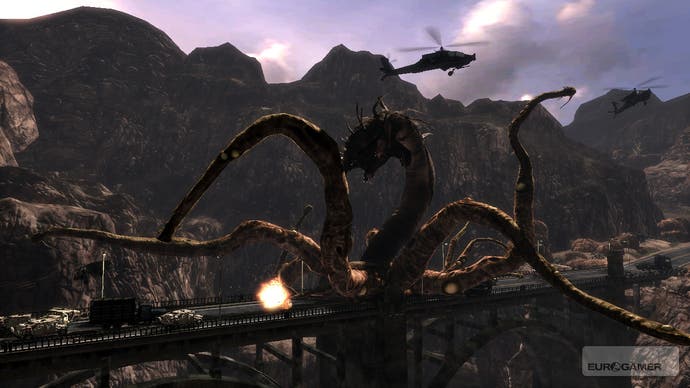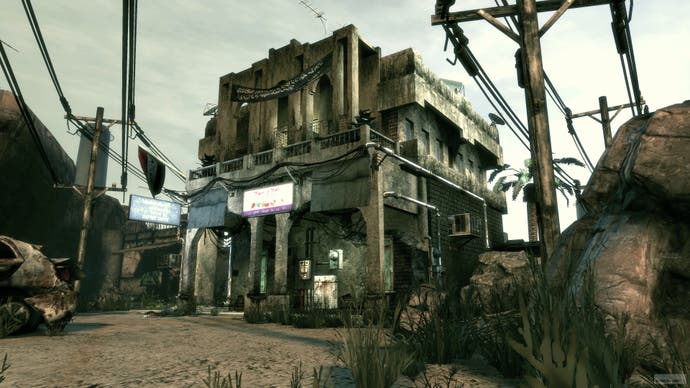Blacksite
Harvey Smith: "My government is full of monsters."
I think you're asking a couple of different questions. One, can games get away with that? And my flip answer is "we're gonna find out". Deus Ex got away with some of that stuff. The trick will be when the mainstream media notices it. Because no one in the mainstream media noticed Deus Ex. We won a BAFTA, we got a lot of praise, there was a German avant-garde play, but nobody in the mainstream media cared about Deus Ex or noticed it. It didn't sell; it sold basically a million copies. And so what happens when the mainstream media picks up on that? That's one interesting angle on it.
And then the other question you're implicitly asking, I think, is by trying to tackle difficult subject matter, are games trivialising the subject matter because inherently they're not capable of sophisticated expression? And I think people believed that about comic books, for instance, before the comic Maus came out. And that's like, "okay, you're dealing with the Holocaust in a comic book - how can you do that?" And it's like, "no, this is a serious story, just rendered with cats and mice and dogs". I'm not saying that we're Maus or anything like that. I know that we're only incremental in terms of like, you know, I mean film has done much more subversive stuff than what we're doing, for instance. But at the same time, I do think that videogames are going there. I think if... America's Army is the most political game anyone's ever made. It is a complete commercial for the right wing. So, if that's a super-political game, what's wrong with making a game that questions the role of the US military in the world and the role of the military-industrial complex? I don't think we're any more political than America's Army - we're just on the other side of the split.

[Laughs]
That's an interesting question, because Gears is almost entirely - I love Gears, it's beautiful - but it's almost entirely scripted, what the squad does. On the opposite end you have GRAW [Ghost Recon Advanced Warfighter], which is this tweaky little menu-type system where you could tweak out all these different things. And what we wanted - it's kind of a non-answer, because we're not really on that axis, I don't think. We wanted flexibility of telling your guys where to go and what to do without the menu. And so we are somewhere in the middle probably in terms of how much control you have over them; maybe even toward GRAW. But we're definitely toward the other end of the spectrum in terms of flexibility.
You know, you pull the squad bumper [button] and wherever the cursor's at they go do it. So they either go to that spot and take cover, or they go attack that enemy, or they go attack that turret, get in a vehicle, or they open a door, or kick off a cinematic. If that was all we did, it'd be great, but on top of that, we find that players do two things over and over once they learn the sort of vernacular of how to use the game: they send people further down the hall to see if it's safe, or down the street, and then if a fight kicks off they take up a more tactical location; and then once they get used to it they also send the squad to attack an enemy, and then they try and sneak around behind the enemy. And just those two simple tactics that you would see kids in a backyard - if they had toys like this - playing, that changes the experience as well.
It is like a weapon. We had it on a trigger at one point, because it's like "gun and squad", and put the cursor somewhere and either send the squad or fire. But we moved it to a bumper at a certain point. But we want it to be as easy as firing a gun.

Oh I see. We also want you to empathise with them. But what I learned from Deus Ex was that repeat exposure to characters and seeing them suffer is how you care about them. And so Cody Grayson, Logan Somers, Noa Weis and Mitchell Ambrose - Mitchell Ambrose is a black guy from New Orleans, so we talk about Katrina as well, and the role of the government in undermining the funding for the people there, and the role of the government in making global warming worse that caused the problem in the beginning, so he alludes to New Orleans and Katrina; Noa is a woman from the Middle-East, who has a very global perspective on the US presence over there; Grayson is just like gung-ho, kick-ass, but he's very rebellious; and Somers is very gung-ho, but he is very, like, follow-orders-get-promoted and that kind of thing. And so there we have four personalities and you're just around them the whole time; they're just talking to you the whole time.
We try to keep them from being obnoxious, but we hope that by exposing you to them over and over and over and over, as you see their stories unfold you will eventually care about them. That's the goal.
Blacksite is due out on Xbox 360, PlayStation 3 and PC later this year. You can read our impressions of the Xbox 360 version elsewhere on the site.








